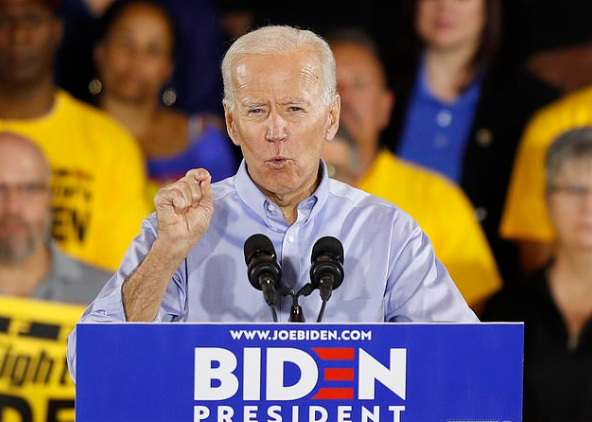Joe Biden has cemented his position as front-runner in the Democratic race to take on President Donald Trump in November’s White House election.
The former vice-president won Michigan, the biggest prize of primary voting on Tuesday, extending his lead over main rival Senator Bernie Sanders.
Five other states – Washington, Missouri, Mississippi, Idaho and North Dakota – voted on Tuesday.
Mr Biden also swept aside Mr Sanders in Missouri, Mississippi and Idaho.
It was unclear if Mr Sanders would fight on until the party convention in July.
The Democrats’ next big election milestone is in a week’s time when 577 delegates are up for grabs.
To secure the nomination, a candidate needs the support of 1,991 delegates. Before Tuesday’s vote, Mr Biden had 648 to Mr Sanders’ 563.
The former vice-president had lagged behind his Democratic rivals in early voting states, but rebounded after big wins on Super Tuesday and endorsements from several former nomination rivals.
Joe Biden’s campaign looked all but lost at the start of the primary season in February. The former vice-president, 77, finished a poor fourth in the Iowa caucuses and fifth in the New Hampshire primary.
But the turn came with South Carolina – where he won due to the support of the large African-American community – and on the 3 March Super Tuesday he won 10 out of 14 states at stake, establishing a sizeable lead over the Vermont senator.
Thanking supporters from Philadelphia on Tuesday evening, Mr Biden said Democrats, including supporters of Bernie Sanders, could beat Donald Trump.
“It’s more than a comeback, this campaign,” he said. “It’s comeback for the soul of this nation.”
“Tonight we are a step closer to restoring dignity and honour to the White House,” Mr Biden added.
“We have to lead the world again,” the former vice-president said. “Donald Trump’s America First policy has made America alone.”
Senator Sanders, 78, enjoys widespread support among young voters, but has so far failed to turn that into electoral success.
Mississippi was the first state to be called for Biden on Tuesday, and it was only the latest example of the strengths of his campaign – and another reason why the former vice-president appears to be in the driver’s seat as the primary season unfolds.
As in South Carolina, the state that started Biden’s political revival, more than 60% of the Mississippi electorate is black. And, as in South Carolina, the former vice-president dominated that demographic, to the tune of 86-11.
The common refrain that a Democrat can’t win the nomination without the support of black voters, somewhat in doubt after Sanders’ dominating win in the Nevada caucuses, now seems to once again be an ironclad rule.
Four years ago, Michigan gave Bernie Sanders a surprise win, breathing new life into a campaign that was struggling. This time around, the Midwestern state could mark the beginning of the end for his campaign.
Barring some sort of drastic change in the race, a recovery seems unlikely in the extreme. With every state Sanders loses, he falls farther behind – and the more improbable his comeback would be.



